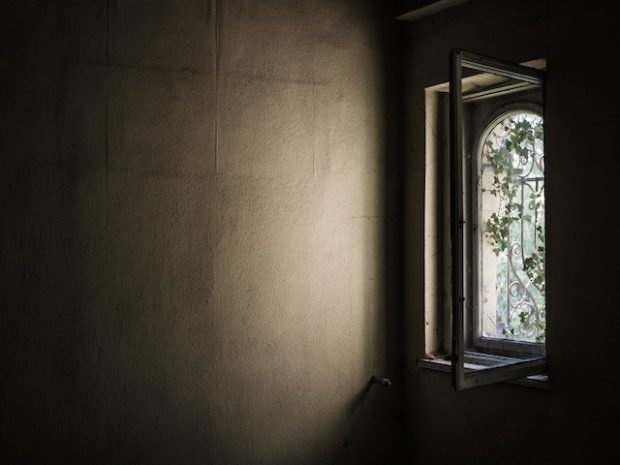You have no items in your cart. Want to get some nice things?
Go shopping
It’s 2:47 a.m. and my husband Marc hums in his sleep, as if contemplating something lovely and harmless, say, a buffet of nice cheese. He garbles a few words, sounding like an amused drunk, “Gerflah … kezabulla!” Then the snoring starts.
By day, Marc is an architect as well as a hands-on father who folds more than his share of laundry. He takes care of insurance policies and clumps of yucky stuff in the drain. He thinks my wrinkles and gray hair are sexy. Nearly fifty, he’s still as trim and athletic as when I first laid eyes on him, back when he was twenty-one and I was seventeen. But right now I’m wishing we’d never met.
“Roll over,” I order, nudging his shoulder not so gently. He lets out a throaty guffaw, as unflappable in sleep as he is awake. I reach for the earplugs.
I can deal with the snoring. The problem is that we bought a house. Buying a sweater is hard enough – there is nothing in my closet that has not been returned at least once for a different size or color – but signing the papers on a house is the most colossal commitment I have ever made all at once.
The house is outside of Berlin, where I’ve lived since 1994. Marc is German but I grew up in Detroit. Our twenty-seven year relationship has grown over time, bit by bit, like one of those add-a-bead necklaces: blind date, long-distance, joint lease, one account, two kids… But who said I wanted anything hanging around my neck?
“It’s not like the question of coffee or tea,” said Frau von B, the smirking therapist I visited for years. “You can have both, you know – a fear of commitment and a long-term relationship.”
After my parents’ divorce when I was seven, my mom, a free-spirited musician, stayed in the city to face addiction and poverty in a string of grungy apartments while my dad, a conservative doctor, hightailed it to the suburbs with his new wife and took up golf. Joint custody left me straddling the divide between country club and thrift store.
Committing to one lifestyle or the other was impossible. I was a perpetual outsider – be it at the private academy I attended in Waspy Grosse Pointe or the almost entirely black Detroit public high school from which I graduated. I was not the kind of girl who married the boy she took to the prom. But that’s the kind of woman I’ve become.
“I was seven-teen, going on eight-teen…” This is how I launch into the tale when people ask how we met. I tell them how I noticed Marc’s elegant hands and calm gray eyes, how we hid behind our menus, electrified when our furtive glances met, how neither of us ate a bite, how the very next day, in a rented tux and a borrowed dress, we endured that all-American rite of passage: the prom. I hadn’t planned on attending but Marc was curious. He was a foreigner and I had always felt like one; we made the perfect couple.
Moving to Berlin a few years later seemed the most obvious thing to do. It was a playground of bullet-pocked streets and underground clubs. Rent was cheap and so was beer, but forging my way in a new country wasn’t easy.
Little old ladies scolded me for crossing the street at a red light. Grumpy bureaucrats refused to grant me permits. People at parties lectured me on the vacuity of American culture. And I – scrappy by nature, chameleon at heart – wrangled with them all like a native. My German became impeccable but I grew homesick for a place that no longer existed. I could go back to visit, but the gap initially created by my absence had closed.
I found myself paralyzed: committing to the future meant giving up the past. Waves of depression swelled. When they knocked me down – panic attacks leading to catatonic days in bed – Marc rushed in to save me, locking us into the roles of invalid and caregiver, a bond neither of us had imagined: one that imprisoned us.
Eventually I sobbed to Frau von B that Marc was having an affair. She was sympathetic but duly analytical, diagnosing the situation as a “spätpubertierender Befreiungsversuch” – a late pubescent escape bid.
I made a bid of my own, dabbling in adultery, ditching a floundering career and embarking on serious self-help: yoga, meditation, retreats – the whole spiritual shebang. The idea of a fresh start was alluring. I threw away junk, pureed kale, painted walls lavender. When the dust of mid-life crisis settled, it turned out I still loved the guy I had taken to the prom. But a little equanimity only goes so far… Sometimes that guy was just a twit in a V-neck sweater.
And sometimes he was a divine prince. Watching him drive the car made me giddy with desire. Every conversation was a thrill. Finding him was sheer luck, a life together more than I deserved. But over time my fickle heart would beat a little slower. He’d make a tone-deaf comment. I’d notice that V-neck sweater. Then it was all downhill again…
His stash of Houellebecq novels signaled inner decay. His failure to laugh at a joke betrayed the icy Teutonic blood in his veins. His inability to appreciate Radiohead made me wonder how I could have chained myself to someone so essentially different. Of all the men in the world, why this one?
With a shrug, Frau von B once ventured, “Perhaps you use doubt to keep love alive.”
It made sense. Any long-term relationship requires a lasting connection. Some couples worship at the same altar, be it The Muscle Shack or Our Lady of Perpetual Suffering; others are linked in a mutual effort to sell hot tubs or save the spotted owl. We bond by playing a never-ending version of hard-to-get – I am hard to live with, but he gets me.
And I remain dubious of the happily-ever-after – even though the odds my marriage won’t end in divorce are no longer as bleak as winter in Berlin. I cope with the Siberian cold and impenetrable clouds by hiding out in the sauna and blasting myself with 10,000 Lux. Escape fantasies alleviate the anxiety, but it’s hard to imagine yourself traipsing around Asia with a backpack when you’re shopping for roofers in Germany. And then there’s the mortgage, which literally means “dead pledge”.
When Marc first brought up the idea I said, “Are you crazy?”
Talk of interest rates and property tax was a complete turn-off, yet I swooned at the vague notion of being rooted to a piece of land. My ups and downs might have become less Himalayan but my neurotic ambivalence had segued from romance to real estate.
We spent weekends driving out to look at places for sale: too big, too small, too far from the city, too close to a wind farm, under a flight path, over a sinkhole… Just as we were losing hope we discovered a viable house near a nature reserve. But we had searched long enough to know that there would always be a hitch. Asbestos siding was attached to the wood construction using aluminum East German coins in place of washers.
“You’ll be rich when you take it down,” the owner joked nervously.
The property also boasted some iffy plumbing and creative wiring, a buckling roof, a collapsing barn, a handful of dead fruit trees… But the view expanded to a sliver of lake in the distance. I looked into those calm gray eyes. It was clear this was the one. Some instinct was always telling me to run, but a deeper-seated one was seeking home. We made an offer fifteen minutes later.
So far we’ve torn down half the barn.
At 3:59 a.m. I am still wide-awake, doubts running rampant in my head like a horde of mutant hamsters. Will this be our financial ruin? Should we have held out for a place in need of less improvement, displaying more charm, closer to the lake? In short: something better?
I wake to a frosty morning, my enthusiasm for the project having plunged lower than the temperature. We need to drive out to our little barren patch of Prussia and turn off the water before the pipes freeze, but I’d rather be on my way to Polynesia – as a different version of my younger self.
My teeth clench as we roll through the last intersection and hit the autobahn. Marc drives: not a prince, not a twit, just the man I love. Trees hurtle past the windows much too fast. I feel trapped, at the mercy of forces beyond my control: time and nature.
“There ain’t no cure for life,” Frau von B used to sing now and then in her off-key warble, misquoting Leonard Cohen with Freudian flair.
I stand in front of the house with a set of skeleton keys in my hand. It looks worse now that the leaves have fallen.
“I’m afraid,” I say.
“I know,” Marc says.
The echoing space is cold and sooty – the coal-burning oven has been ripped out since we were last here – but the way the winter sun scatters oblong shapes across the floorboards makes it feel remarkably promising. Marc shuts off the water and shifts into architect mode, zapping measurements with his laser gun, tapping along the wall to discern where the wiring runs. My fingers dance over a pane of stamped glass held into the bathroom door with two S-shaped brass handles – an awkward construction that is nonetheless charming.
We follow the creaky stairs that lead up to the attic, discussing which walls to knock down, where windows should be. I can see the view of the lake that is still obscured by peeling woodchip paper, stacks of bricks and a layer of asbestos. But I can also sense the chaos of construction, the exorbitant cost, the endless hassle. Marc knows exactly what I’m thinking.
“It’ll be worth it,” he says, taking my hand.

About Lizzie Roberts
Lizzie Roberts grew up in Detroit and lives in Berlin, where she raises children and collects lint. Her writing has been published in Wanderlust, Sand and in the anthologies Home is Elsewhere and Streets of Berlin. She was shortlisted for The Arkansas International Emerging Writer’s Prize 2018 as well as The Berlin Writing Prize 2017. Her blog about losing and finding home can be found on lizzieroberts.com.




